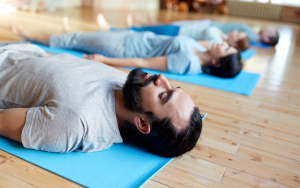Spirituality is Associated with the Long-Term Psychological Health of Cancer Survivors
By John M. de Castro, Ph.D.
“spiritual or religious beliefs and practices create a positive mental attitude that may help a patient feel better and improve the well-being of family caregivers. Spiritual and religious well-being may help improve health and quality of life.” – National Cancer Institute
Surviving cancer has a huge impact on most people. Feelings of depression, anxiety, and fear are very common and are normal responses to this life-changing experience. These feeling can result from changes in body image, changes to family and work roles, feelings of grief at these losses, and physical symptoms such as pain, nausea, or fatigue. People might also fear death, suffering, pain, or all the unknown things that lie ahead. So, coping with the emotions and stress of a surviving cancer is a challenge and there are no simple treatments for these psychological sequelae of cancer.
Religion and spirituality become much more important to people when they survive cancer. It is thought that people take comfort in the spiritual when facing mortality. Hence, spirituality may be useful for the survivors of cancer to cope with their illness and the psychological difficulties resulting from the disease. Thus, there is a need to study the relationships of spirituality on the long-term psychological health of cancer survivors.
In today’s Research News article “The Influence of Daily Spiritual Experiences and Gender on Subjective Well-Being Over Time in Cancer Survivors.” (See summary below or view the full text of the study at: https://www.ncbi.nlm.nih.gov/pmc/articles/PMC7500286/ ) Rudaz and colleagues garnered data from the longitudinal Midlife in the United States (MIDUS) study
of adults that was collected in 2005 and again in 2015. They selected participants who reported having survived cancer and extracted data on spiritual and religious coping, daily spiritual experiences, life satisfaction, positive emotions, and negative emotions.
They report that for both men and women the higher the levels of spiritual experiences at baseline the higher the levels of religious coping, life satisfaction, and positive emotions, and the lower the levels of negative emotions at baseline and 10 years later. In addition, they found that spiritual experiences at baseline moderated the association of life satisfaction at baseline with life satisfaction 10 years later such that participants with low life satisfaction at baseline had a greater increase in life satisfaction 10 years later when they were higher in spiritual experiences. Also, they found that for men but not women that spiritual experiences at baseline moderated the association of positive emotions at baseline with positive emotions 10 years later such that men with low positive emotions at baseline had a greater increase in positive emotions 10 years later when they were higher in spiritual experiences.
These results are correlational and as such causation cannot be determined. But they show that cancer survivors having high levels of spirituality is associated with better psychological health and this is maintained over time. They also show that spirituality is associated with better psychological health 10 years later in cancer survivors who were low in life satisfaction and positive emotions. Hence, spirituality is important for the psychological health of cancer survivors and this lasts over decades.
So, spirituality is associated with the long-term psychological health of cancer survivors.
“Patients reporting greater overall religiousness and spirituality also reported better physical health, greater ability to perform their usual daily tasks, and fewer physical symptoms of cancer and treatment.” – Science Daily
CMCS – Center for Mindfulness and Contemplative Studies
This and other Contemplative Studies posts are also available on Google+ https://plus.google.com/106784388191201299496/posts and on Twitter @MindfulResearch
Study Summary
Rudaz, M., Ledermann, T., & Grzywacz, J. G. (2019). The Influence of Daily Spiritual Experiences and Gender on Subjective Well-Being Over Time in Cancer Survivors. Archive for the psychology of religion = Archiv fur Religionspsychologie, 41(2), 159–171. https://doi.org/10.1177/0084672419839800
Abstract
Cancer survivors are at risk for poor subjective well-being, but the potential beneficial effect of daily spiritual experiences is unknown. Using data from the second and third wave of the Midlife in the United States (MIDUS) study, we examined the extent to which daily spiritual experiences at baseline moderate the association between subjective well-being at baseline and approximately 10 years later in cancer survivors (n = 288). Regression analyses, controlled for age, educational attainment, and religious/spiritual coping, showed that daily spiritual experiences moderated the association between life satisfaction at baseline and follow-up. Specifically, high spiritual experiences enhanced life satisfaction over time in cancer survivors with low life satisfaction at baseline. Also, daily spiritual experiences moderated the association between positive affect at baseline and follow-up, though this moderating effect was different for women and men. No moderating effect emerged for negative affect.
https://www.ncbi.nlm.nih.gov/pmc/articles/PMC7500286/









